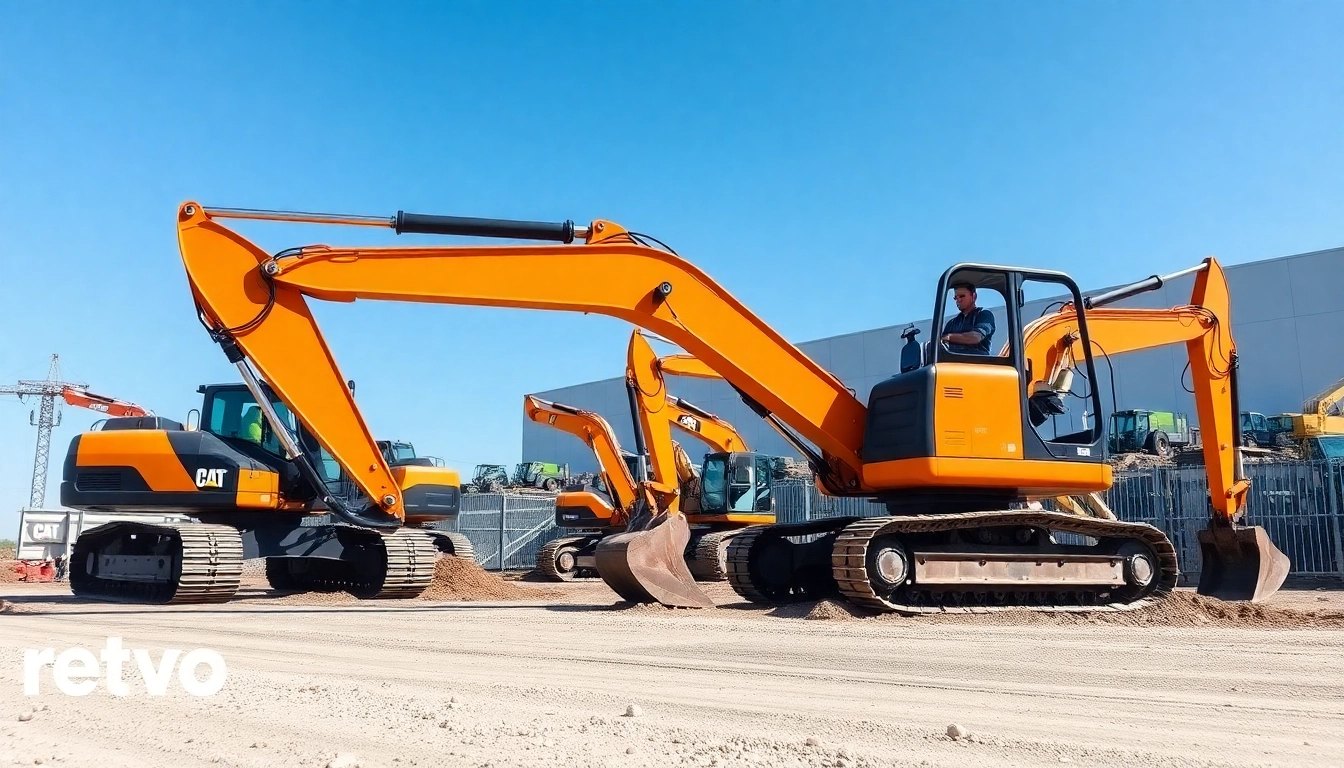Understanding Excavator Rental: Key Benefits and Use Cases
In the dynamic world of construction and excavation, having access to the right machinery can significantly influence project efficiency, cost, and safety. Among the most versatile and essential pieces of equipment are excavators—powerful, adaptable machines capable of handling a wide range of earthmoving tasks. For many businesses, contractors, and DIY enthusiasts, excavator rental offers an optimal solution to meet project demands without the substantial capital investment of ownership. Whether you’re undertaking a small-scale landscaping project or a large infrastructure development, understanding the advantages and nuances of excavator rental is crucial to making informed decisions. To explore this topic comprehensively, visit the excavator rental options available to suit various needs.
Advantages of Renting Excavators for Construction
Opting for excavator rental provides numerous benefits that can enhance project outcomes and operational flexibility. Here are some of the primary advantages:
Cost-Effectiveness
Purchasing an excavator entails a substantial upfront cost, maintenance expenses, and storage considerations. Rental alleviates these financial burdens, allowing companies and individuals to access top-tier equipment for a fraction of the purchase price on a temporary basis. Rental costs typically include maintenance, repairs, and insurance, providing predictability in budgeting.
Access to a Wide Range of Equipment
The rental market offers diverse excavator options—different sizes, configurations, and attachments—tailored to specific project requirements. This flexibility enables users to select precisely what they need without being limited by equipment ownership constraints.
Reduced Maintenance and Downtime
Our rental partners handle routine maintenance and repairs, minimizing project delays caused by equipment failure. This ensures that your project stays on schedule, especially crucial in time-sensitive environments.
Flexibility and Scalability
Rental agreements can be adjusted according to project duration and scope. As project needs evolve, renting allows for quick scaling up or down—accessing larger machines for complex phases or switching to smaller, more maneuverable models for detailed work.
Access to Latest Technology
Rental companies often update their fleets with the newest, most efficient machinery, integrating advanced features like GPS guidance, eco-friendly engines, and operator comfort enhancements. This technological edge can boost productivity and reduce environmental impact.
Legal and Safety Compliance
Renting from reputable providers ensures that equipment adheres to current safety standards and regulations, reducing liability and promoting safe operation on-site. Furthermore, rental companies provide training resources and safety instructions.
In summary, renting excavators optimizes costs, access, and operational flexibility while minimizing risks—cornerstones for successful project execution.
When to Choose Excavator Rental Over Buying
Deciding between purchasing and renting equipment hinges on several factors. While ownership might seem appealing for ongoing projects, rental often presents a more pragmatic choice under certain circumstances:
Project Duration
For short-term or one-off projects, renting can be significantly more economical. Long-term projects might justify ownership if the equipment will be used regularly over several years, amortizing the initial investment.
Project Scope and Size
Large-scale projects with extensive earthmoving demands may favor ownership, especially if equipment utilization is high. Conversely, smaller or sporadic tasks benefit from renting, avoiding idle machinery and storage issues.
Financial Considerations
Renting reduces capital expenditure and allows better cash flow management. It also eliminates worries about depreciation, resale value, and ongoing maintenance costs associated with owned machinery.
Equipment Availability and Technology
Rental providers typically have access to the latest models and specialized attachments. If your project requires advanced features or specific configurations, renting can provide access to cutting-edge technology without additional investment.
Operational Flexibility
Changing project requirements or site conditions may necessitate different types or sizes of excavators. Renting allows for rapid adaptation, while ownership could restrict flexibility due to limited inventory.
Ultimately, the decision should align with an analysis of project needs, budget constraints, and operational goals, making rental the optimal choice for many scenarios.
Common Industries and Projects Using Excavator Rentals
Excavator rentals are integral to a broad spectrum of industries and projects. Their versatility and efficiency make them indispensable tools in various sectors:
Construction and Infrastructure Development
From building foundations to road construction, excavators expedite earthmoving, grading, and material handling. Infrastructure projects such as bridges, tunnels, and utilities installation rely heavily on rental equipment for timely completion.
Landscaping and Grounds Maintenance
For landscaping firms and property developers, micro and mini excavators offer precision in trenching, pond digging, tree removal, and terrain shaping. Their compact size allows access to tight or sensitive sites.
Demolition and Recycling
Excavators equipped with hydraulic breakers or shears facilitate demolition tasks, while their ability to handle heavy debris makes recycling operations more efficient.
Agriculture and Forestry
In agriculture, excavators assist with pond digging, soil movement, and land clearing. Forestry operations utilize specialized attachments for log handling and site preparation.
Oil & Gas, Mining, and Energy
The energy sector employs excavators for pipeline construction, excavation of oil wells, and mining operations, where efficiency and robustness are vital.
This widespread application demonstrates the value of flexible excavator rental services across diverse project landscapes.
Selecting the Right Excavator for Your Needs
Different Types and Sizes of Excavators Available
Understanding the variety of excavators is foundational to selecting suitable equipment. They typically fall into categories based on size, mobility, and operational capacity:
- Micro and Mini Excavators (0.8 – 3 tonnes): Compact, ideal for tight spaces, indoor work, and landscaping projects.
- Small to Medium Excavators (3 – 15 tonnes): Versatile for a range of applications including utility work, small construction sites, and residential projects.
- Large Excavators (15+ tonnes): Suitable for major earthmoving, mining, and large-scale infrastructure projects.
Factors to Consider: Project Scope, Soil Type, and Site Access
Key considerations include:
- Project Size and Complexity: Larger projects require bigger machines with higher lift capacity and reach.
- Type of Soil: Hard, rocky, or clayey terrain may necessitate specialized attachments or more powerful excavators.
- Site Accessibility: Narrow, uneven, or indoor sites might benefit from mini or tracked excavators with maneuverability features.
How to Match Excavator Features to Job Requirements
Align features such as dig depth, reach, lift capacity, and attachment compatibility with your specific tasks. For example, if trenching is needed, select an excavator with appropriate depth capacity. For demolition, look for machines with hydraulic breakers or grapples.
Best Practices for Renting and Operating Excavators
Tips for Efficient and Safe Excavator Usage
Safety begins with proper planning and operation:
- Conduct thorough site assessments before starting work.
- Ensure operators are trained and certified for machinery use.
- Use appropriate attachments and adjust machine settings for optimal performance.
- Maintain clear communication among team members, especially when working in confined spaces.
How to Schedule and Manage Rental Periods
Effective scheduling involves maximizing equipment uptime while controlling costs:
- Coordinate rental durations with project timelines.
- Plan for delivery and removal to avoid delays.
- Monitor usage to prevent overrun costs.
Maintenance and Safety Checks Before and After Use
Routine inspections are vital:
- Check fluid levels, tire/track condition, and hydraulic hoses before operation.
- Inspect safety features such as alarms, lights, and emergency stops.
- Document and report any issues immediately.
Cost Optimization and Budgeting for Excavator Rentals
Understanding Rental Pricing Models and Fees
Rental costs can vary based on machine size, rental duration, and additional services:
- Daily, Weekly, Monthly Rates: Most providers offer tiered pricing. Longer rental periods often reduce daily costs.
- Delivery and Pickup Fees: May be charged separately or included in the package.
- Additional Attachments or Accessories: Extra costs for specialized tools beyond standard equipment.
- Insurance and Damage Waivers: Optional but recommended to mitigate liability.
Ways to Save on Excavator Rental Costs
Cost-saving strategies include:
- Booking in advance to secure better rates.
- Negotiating bundle deals for multiple pieces of equipment.
- Utilizing local rental providers to reduce transportation costs.
- Proper planning to minimize idle rental time.
Estimating Total Project Costs with Equipment Hire
Accurate budgeting should include rental fees, operator costs if hiring skilled personnel, fuel expenses, and contingency funds for unforeseen issues. Use detailed project planning and historical data to refine estimates, ensuring on-budget completion.
Case Studies and Industry Insights
Successful Projects Using Excavator Rentals
Numerous projects underscore the value of rental machinery. For instance, a regional infrastructure development used a fleet of excavators over six months, reducing project costs by 20% compared to ownership. The flexibility of switching between sizes and features facilitated timely completion and high safety standards.
Latest Trends in Excavator Technology and Rental Services
Innovation persists in areas like remote operation, eco-friendly engines, and smart attachments with sensors for real-time diagnostics. Rental services are increasingly offering these advanced options, enabling clients to harness cutting-edge technology without hefty investments.
Future Growth and Opportunities in Excavator Hiring
The industry is poised for continued expansion, driven by urbanization, infrastructure renewal, and sustainable construction practices. Digital platforms are streamlining rental processes, offering real-time availability, flexible leasing, and enhanced customer support. Embracing these trends can provide a competitive edge for users seeking efficient, scalable earthmoving solutions.

